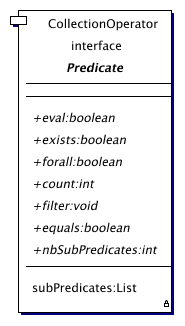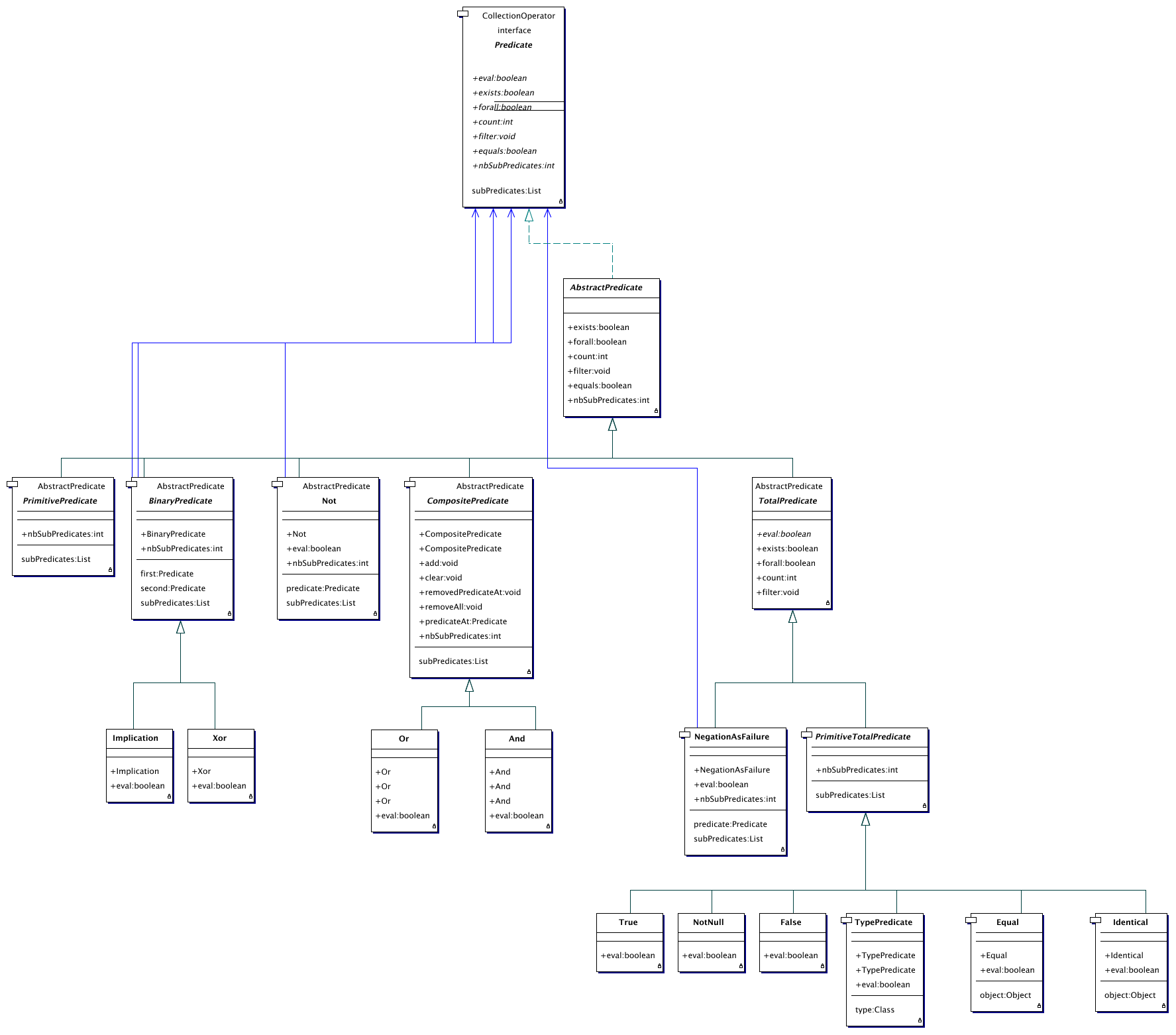true or
false for an object.
 The Predicate class is actually an implementation of the Strategy
pattern.
The Predicate class is actually an implementation of the Strategy
pattern.
|
|||||||||
| PREV PACKAGE NEXT PACKAGE | FRAMES NO FRAMES | ||||||||
true or false.
See:
Description
| Interface Summary | |
| Predicate | A class of predicates that evaluate to true or
false for an object.
 The Predicate class is actually an implementation of the Strategy
pattern.
The Predicate class is actually an implementation of the Strategy
pattern. |
| Class Summary | |
| AbstractPredicate | |
| And | A class of predicates that evaluates to the and of a number
of other predicates.
 For efficiency reasons, the conditional and will be computed.
For efficiency reasons, the conditional and will be computed. |
| BinaryPredicate | A class of predicates that evaluates an object using two other predicates.
 |
| CompositePredicate | A class of predicates that evaluates an object using a number of
other predicates.
 |
| Equal | A class of predicate that check whether or not the given argument
equals getObject().
 |
| False | A special total predicate that always returns false for
eval() |
| Identical | A class of predicate that check whether or not the given argument
is the same as some object.
 |
| Implication | A class of predicates that evaluates to the implication of two other predicates. |
| NegationAsFailure | A class of predicates that wrap another predicate and treat the
occurrence of an exception in
eval()
as false.
 Note that if you wrap a NegationAsFailure object in another predicate,
you will not get the same result as when switching the wrapping predicate
and the NegationAsFailure.
Note that if you wrap a NegationAsFailure object in another predicate,
you will not get the same result as when switching the wrapping predicate
and the NegationAsFailure. |
| Not | A class of predicates that negate another predicate.
 |
| NotNull | A special total predicate that checks whether or not objects are different
from null.
 |
| Or | A class of predicates that evaluates to the or of a number
of other predicates.
 For efficiency reasons, the conditional
For efficiency reasons, the conditional or will be
computed. |
| PrimitivePredicate | A class of predicates that have no subpredicates.
 Since a primitive predicate does not contain any subpredicates, this
abstract class implements
Since a primitive predicate does not contain any subpredicates, this
abstract class implements
nbSubPredicates()
and getSubPredicates().
Typically, this class will be used as an anonymous inner class as follows:
Predicate myPredicate = new PrimitivePredicate() {
/oo
o also public behavior
o
o post postcondition;
o/
public boolean eval(Object o) throws MyException {
//calculate boolean value
//using the given object
}
};
|
| PrimitiveTotalPredicate | A class of total predicates that have no subpredicates.
 This class implements the
This class implements the
nbSubPredicates()
and getSubPredicates()
methods for predicates that don't contain any sub predicates. |
| TotalPredicate | A class of Predicates that do not throw exceptions.
 If your predicate don't throw exceptions, you should subclass
TotalPredicate.
If your predicate don't throw exceptions, you should subclass
TotalPredicate. |
| True | A special total predicate that always returns true for
eval() |
| TypePredicate | A class of predicate that check whether or not an object conforms to
a certain type.
 This class is typically used as follows:
This class is typically used as follows:
TotalPredicate predicate = new TypePredicate(MyClass.class);
When a TypePredicate is used as a constant in an interface,
the .class operator will return null, so in that
case you must pass the name of the class as a String:
TotalPredicate predicate = new TypePredicate("mypackage.MyClass");
|
| Xor | A class of predicates that evaluates to the xor of two
other predicates.
 |
Provides for predicates that map an object to true or false. A predicate encapsulates a unary function of type Object -> boolean. Using a predicate, it is possible to reuse a function so that it can be passed to a method as an argument.

Suppose that I want to retrieve all wednesdays from a collection, and let's
assume they are represented by a Calendar object with a DAY_OF_WEEK field that equals Calendar.WEDNESDAY.
Let's assume further that our collection contains other objects than Calendar objects, so that we know nothing about the type of the objects.
Collection myClone = new ArrayList(myCollection);
TotalPredicate isWednesday = new PrimitiveTotalPredicate() {
public boolean eval(Object o) {
return (o instanceof Calendar) && (((Calendar)o).DAY_OF_WEEK == Calendar.WEDNESDAY);
}
};
isWednesday.filter(myClone);
Suppose I've got all days on which there is a party in a collection. Now I want to know whether or not there is a party on a wednesday. I can reuse the isWednesday predicate from above.
boolean partyOnWednesday = isWednesday.exists(partyDays);
Now I want all parties that are not on a wednesday. Although the criterion is slightly different now, I can still reuse isWednesday. All I have to do is invert is with Not.
Collection partiesNotOnWednesday = new ArrayList(partyDays);
new Not(isWednesday).filter(partiesNotOnWednesday);
|
|||||||||
| PREV PACKAGE NEXT PACKAGE | FRAMES NO FRAMES | ||||||||